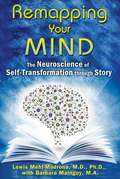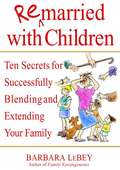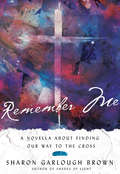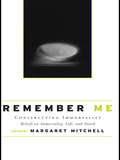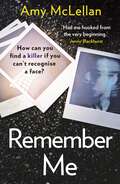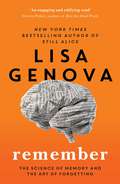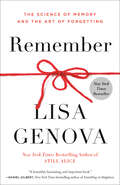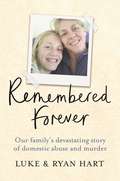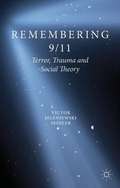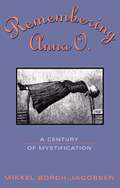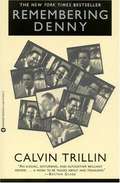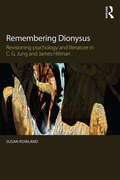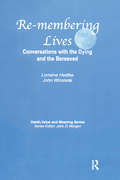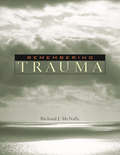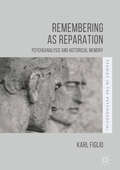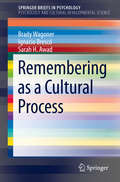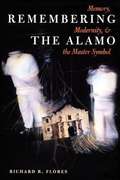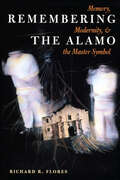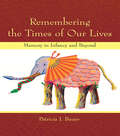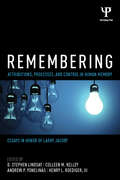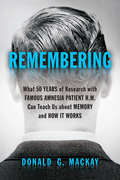- Table View
- List View
Remapping Your Mind: The Neuroscience of Self-Transformation through Story
by Lewis Mehl-Madrona Barbara MainguyA guide to retelling your personal, family, and cultural stories to transform your life, your relationships, and the world • Applies the latest neuroscience research on memory, brain mapping, and brain plasticity to the field of narrative therapy • Details mind-mapping and narrative therapy techniques that use story to change behavior patterns in ourselves, our relationships, and our communities • Explores how narrative therapy can help replace dysfunctional cultural stories with ones that build healthier relationships with each other and the planet We are born into a world of stories that quickly shapes our behavior and development without our conscious awareness. By retelling our personal, family, and cultural narratives we can transform the patterns of our own lives as well as the patterns that shape our communities and the larger social worlds in which we interact. Applying the latest neuroscience research on memory, brain mapping, and brain plasticity to the field of narrative therapy, Lewis Mehl-Madrona and Barbara Mainguy explain how the brain is specialized in the art of story-making and story-telling. They detail mind-mapping and narrative therapy techniques that use story to change behavior patterns in ourselves, our relationships, and our communities. They explore studies that reveal how memory works through story, how the brain recalls things in narrative rather than lists, and how our stories modify our physiology and facilitate health or disease. Drawing on their decades of experience in narrative therapy, the authors examine the art of helping people to change their story, providing brain-mapping practices to discover your inner storyteller and test if the stories you are living are functional or dysfunctional, healing or destructive. They explain how to create new characters and new stories, ones that excite you, help you connect with yourself, and deepen your intimate connections with others. Detailing how shared stories and language form culture, the authors also explore how narrative therapy can help replace dysfunctional cultural stories with those that offer templates for healthier relationships with each other and the planet.
Remarried with Children
by Barbara LebeyIt's the most daunting task many parents will ever face: bringing two growing families together into one brand new marriage. But even though statistics show that most remarriages are at high risk--especially when there are kids involved--more and more people are learning how to make them work and more and more kids are coming out of them with their psyches and souls intact. This honest and hopeful book looks at those successes--and at some failures--to show what they have in common: ten essential secre...
Remember Me: A Novella about Finding Our Way to the Cross
by Sharon Garlough Brown"'It is finished,' Jesus says. It's a bold declaration for us to make too. What does it mean to say 'It is finished' when so much is unfinished?Shades of Light
Remember Me: Constructing Immortality - Beliefs on Immortality, Life, and Death
by Margaret MitchellRemember Me brings together contributors from around the world with unique insight on the ways in which one's relationship with loved ones continues, endures, and perhaps even grows after death. Much of the available literature speaks of healthy bereavement as letting go of the deceased and moving forward with life. This new text challenges that notion, discussing the meaning attributed to death and to the anticipation of death. The living, as presented in these innovative chapters, construct social entities of those who have died, via the carrying out of wishes in the Will; pursuing legal claims; or simply attributing certain desires, emotions, or choices to the deceased reconstitutes them as active, even vital, voices even after biological death. Just as life itself, the end of life and death is an interdisciplinary matter. A clear psychological theme and focus ties together these perspectives under three conceptual areas: the anticipation of death; the social life of the deceased and the legal embodiment of the deceased.
Remember Me: The gripping, twisty page-turner you won't want to put down
by Amy McLellan'Complex, intriguing, clever, twisty, beautifully put together'MARI HANNAH, author of WITHOUT A TRACE* * * * * * *How do you find a killer when you can't recognise a face?Last night my sister was murdered. The police think I killed her.I was there. I watched the knife go in. I saw the man who did it.He's someone I know. But he won't be caught.Because he knows I have prosopagnosia - I can't recognise faces.But if I don't find him, I'll be found guilty of murder.* * * * * * *Praise for REMEMBER ME:'Had me hooked from the very beginning, a gripping premise and such a deliciously flawed cast of characters' JENNY BLACKHURST'Beautifully written...Truly shocking, this is a book that will have everyone talking about it'MARY TORJUSSEN'Loved the protagonist from the first chapter and was rooting for her until the end' SARAH WARD'Hooks you from the start, with a twisty, page-turning pace that keeps you guessing' JAMES SWALLOW
Remember Me: The gripping, twisty page-turner you won’t want to put down
by Amy McLellan'Complex, intriguing, clever, twisty, beautifully put together'MARI HANNAH, author of WITHOUT A TRACE* * * * * * *How do you find a killer when you can't recognise a face?Last night my sister was murdered. The police think I killed her.I was there. I watched the knife go in. I saw the man who did it.He's someone I know. But he won't be caught.Because he knows I have prosopagnosia - I can't recognise faces.But if I don't find him, I'll be found guilty of murder.* * * * * * *Praise for REMEMBER ME:'Had me hooked from the very beginning, a gripping premise and such a deliciously flawed cast of characters' JENNY BLACKHURST'Beautifully written...Truly shocking, this is a book that will have everyone talking about it' MARY TORJUSSEN'Loved the protagonist from the first chapter and was rooting for her until the end' SARAH WARD'Hooks you from the start, with a twisty, page-turning pace that keeps you guessing' JAMES SWALLOW
Remember: The Science Of Memory And The Art Of Forgetting
by Lisa GenovaA fascinating exploration of the intricacies of how we remember, why we forget, and what we can do to protect our memories, from the Harvard-trained neuroscientist and bestselling author of Still Alice. Have you ever felt a crushing wave of panic when you can&’t for the life of you remember the name of that actor in the movie you saw last week, or you walk into a room only to forget why you went there in the first place? If you&’re over forty, you&’re probably not laughing. You might even be worried that these lapses in memory could be an early sign of Alzheimer&’s or dementia. In reality, for the vast majority of us, these examples of forgetting are completely normal. Why? Because while memory is amazing, it is far from perfect. Our brains aren&’t designed to remember every name we hear, plan we make, or day we experience. Just because your memory sometimes fails doesn&’t mean it&’s broken or succumbing to disease. Forgetting is actually part of being human. In Remember, neuroscientist and acclaimed novelist Lisa Genova delves into how memories are made and how we retrieve them. You&’ll learn whether forgotten memories are temporarily inaccessible or erased forever and why some memories are built to exist for only a few seconds (like a passcode) while others can last a lifetime (your wedding day). You&’ll come to appreciate the clear distinction between normal forgetting (where you parked your car) and forgetting due to Alzheimer&’s (that you own a car). And you&’ll see how memory is profoundly impacted by meaning, emotion, sleep, stress, and context. Once you understand the language of memory and how it functions, its incredible strengths and maddening weaknesses, its natural vulnerabilities and potential superpowers, you can both vastly improve your ability to remember and feel less rattled when you inevitably forget. You can set educated expectations for your memory, and in doing so, create a better relationship with it. You don&’t have to fear it anymore. And that can be life-changing. &‘Using her expertise as a neuroscientist and her gifts as a storyteller, Genova explains the nuances of human memory. As with her previous books, this is an engaging and edifying read.&’ Steven Pinker, Johnstone Professor of Psychology, Harvard University, author of How the Mind Works &‘No one writes more brilliantly about the connections between the brain, the mind, and the heart. Remember is a beautiful, fascinating, and important book about the mysteries of human memory—what it is, how it works, and what happens when it is stolen from us. A scientific and literary treat that you will not soon forget.&’ Daniel Gilbert, Edgar Pierce Professor of Psychology, Harvard University, New York Times bestselling author of Stumbling on Happiness &‘In Remember, Lisa Genova provides easy-to-follow, no nonsense advice on how to maximize one of the greatest outputs of your brain—memory. But, more important, she also lets us know that while memory is a tremendous gift, the real you is much more than just what you can remember!&’ Rudolph E. Tanzi, PhD, professor of neurology, Harvard Medical School, coauthor of The Healing Self
Remember: The Science of Memory and the Art of Forgetting
by Lisa GenovaA fascinating exploration of the intricacies of how we remember, why we forget, and what we can do to protect our memories, from the Harvard-trained neuroscientist and bestselling author of Still Alice. <P><P>Have you ever felt a crushing wave of panic when you can't for the life of you remember the name of that actor in the movie you saw last week, or you walk into a room only to forget why you went there in the first place? If you're over forty, you're probably not laughing. You might even be worried that these lapses in memory could be an early sign of Alzheimer's or dementia. In reality, for the vast majority of us, these examples of forgetting are completely normal. Why? Because while memory is amazing, it is far from perfect. <P><P>Our brains aren't designed to remember every name we hear, plan we make, or day we experience. Just because your memory sometimes fails doesn't mean it's broken or succumbing to disease. Forgetting is actually part of being human. In Remember, neuroscientist and acclaimed novelist Lisa Genova delves into how memories are made and how we retrieve them. You'll learn whether forgotten memories are temporarily inaccessible or erased forever and why some memories are built to exist for only a few seconds (like a passcode) while others can last a lifetime (your wedding day). You'll come to appreciate the clear distinction between normal forgetting (where you parked your car) and forgetting due to Alzheimer's (that you own a car). <P><P>And you'll see how memory is profoundly impacted by meaning, emotion, sleep, stress, and context. Once you understand the language of memory and how it functions, its incredible strengths and maddening weaknesses, its natural vulnerabilities and potential superpowers, you can both vastly improve your ability to remember and feel less rattled when you inevitably forget. You can set educated expectations for your memory, and in doing so, create a better relationship with it. You don't have to fear it anymore. And that can be life-changing. <P><P><b>A New York Times Bestseller</b>
Remembered Forever: Our family's devastating story of domestic abuse and murder
by Luke Hart Ryan HartPraise for Luke and Ryan Hart's memoir:'A powerful, searing account from incredible brothers and an important contribution to our understanding of domestic abuse' Victoria Derbyshire'... a courageous account of domestic abuse and the devasting impact it has on families' Jeremy Corbyn MP'Relevant and inspiring' Chris Green, White Ribbon UKOn 19 July 2016, Claire and Charlotte Hart were murdered, in broad daylight, by the family's father. He shot his wife and daughter with a sawn-off shotgun before committing suicide.REMEMBERED FOREVER is the shocking story of what led to this terrible crime. Luke and Ryan Hart, the family's two surviving sons, lived under the terror of coercive control. Their father believed that his family members were simply possessions, never referring to them by their names ... just as Woman, Boy, Girl. Written by the boys, but laced with the voices of Claire and Charlotte, this gripping and moving account brings deeper understanding to the shocking crime of domestic abuse and homicide.Luke and Ryan Hart have become spokespeople for the victims who are so often silenced but must never be forgotten.
Remembering 1916
by Richard S. Grayson Grayson, Richard S. and McGarry, Fearghal Fearghal McgarryThe year 1916 witnessed two events that would profoundly shape both politics and commemoration in Ireland over the course of the following century. Although the Easter Rising and the Battle of the Somme were important historical events in their own right, their significance also lay in how they came to be understood as iconic moments in the emergence of Northern Ireland and the Irish Republic. Adopting an interdisciplinary approach drawing on history, politics, anthropology and cultural studies, this volume explores how the memory of these two foundational events has been constructed, mythologised and revised over the course of the past century. The aim is not merely to understand how the Rising and the Somme came to exert a central place in how the past is viewed in Ireland, but to explore wider questions about the relationship between history, commemoration and memory.
Remembering 9/11
by Victor Jeleniewski SeidlerRemembering 9/11 recalls the afterlife of the tragedy and the shock that led many to ask 'why do they hate us so much?' Engaging with the different voices that attempted to make sense of the trauma, Seidler traces the narratives of fear, loss and vulnerability and the ways in which they evolved into feelings of rage and retribution.
Remembering Anna O.: A Century of Mystification
by Mikkel Borch-JacobsenRemembering Anna O. offers a devastating examination of the very foundations of psychoanalytic theory and practice, which was born with the publication of Breuer and Freud's Studies on Hysteria in 1895. Breuer described the case of Anna O., a young woman afflicted with a severe hysteria whom he had cured of her symptoms by having her recount under hypnosis the traumatic events that precipitated her illness. Drawing on the most recent Freud scholarship and on long-secret documents, Borch-Jacobsen demonstrates, however, that Anna O. (Bertha Pappenheim) was never cured by Breuer's "talking cure" and that both Breuer and Freud knowingly falsified the historical record. Borch-Jacobsen points out the numerous inconsistencies in Breuer's account that suggests that Anna O.'s symptoms were simulated to meet Breuer's theoretical expectations and that her famed "reminiscences" were in fact fictitious memories induced by Breuer in the course of a hypnotic treatment.
Remembering Denny
by Calvin TrillinAuthor examines the life of Denny, the emblematic college hero of 1957 America. From Denny's Yale graduation and turn as a Rhodes Scholar to his eventual suicide as a middle-aged, mid-level academic, author charts the mysterious course of a life.
Remembering Dionysus: Revisioning psychology and literature in C.G. Jung and James Hillman
by Susan RowlandDionysus, god of dismemberment and sponsor of the lost or abandoned feminine, originates both Jungian psychology and literature in Remembering Dionysus. Characterized by spontaneity, fluid boundaries, sexuality, embodiment, wild nature, ecstasy and chaos, Dionysus is invoked in the writing of C. G. Jung and James Hillman as the dual necessity to adopt and dismiss literature for their archetypal vision of the psyche or soul. Susan Rowland describes an emerging paradigm for the twenty-first century enacting the myth of a god torn apart to be re-membered, and remembered as reborn in a great renewal of life. Rowland demonstrates how persons, forms of knowing and even eras that dismiss Dionysus are torn apart, and explores how Jung was Dionysian in providing his most dismembered text, The Red Book. Remembering Dionysus pursues the rough god into the Sublime in the destruction of meaning in Jung and Jacques Lacan, to a re-membering of sublime feminine creativity that offers zoe, or rebirth participating in an archetype of instinctual life. This god demands to be honoured inside our knowing and being, just as he (re)joins us to wild nature. This revealing book will be invigorating reading for Jungian analysts, psychotherapists, arts therapists and counsellors, as well as academics and students of analytical psychology, depth psychology, Jungian and post-Jungian studies, literary studies and ecological humanities.
Remembering Lives: Conversations with the Dying and the Bereaved (Death, Value And Meaning Ser.)
by John Winslade Lorraine HedtkeGrief is frequently thought of as an ordeal we must simply survive. This book offers a fresh approach to the negotiation of death and grief. It is founded in principles of constructive conversation that focus on "remembering" lives, in contrast to processes of forgetting or dismembering those who have died. Re-membering is about a comforting, life enhancing, and sustaining approach to death that does not dwell on the pain of loss and is much more than wistful reminiscing. It is about the deliberate construction of stories that continue to include the dead in the membership of our lives.
Remembering The Future, Imagining The Past: Story, Ritual, And The Human Brain
by David HogueBrain research is opening up our understanding of not only what role the different areas of our brain play in making decisions or in recognizing the faces of those we love, but even in experiencing God. As a pastoral theologian and counselor, Hogue values and utilizes the significant resources of the brain sciences for the work of the church in guiding, healing, and challenging persons and systems informed by our current understanding of the central nervous system. His latest book, Remembering the Future, Imagining the Past, is an especially useful resource for all those persons concerned with the practical theological arts of preaching, worship, pastoral care, and counseling, as well as those interested in how our increasing knowledge of the ways in which our brains work can help us understand and tailor our spiritual and pastoral practices in the church.
Remembering Trauma
by Richard J. McNallyAre horrific experiences indelibly fixed in a victim's memory? Or does the mind protect itself by banishing traumatic memories from consciousness? How victims remember trauma is the most controversial issue in psychology today, spilling out of consulting rooms and laboratories to capture headlines, rupture families, provoke legislative change, and influence criminal trials and civil suits. This book, by a clinician who is also a laboratory researcher, is the first comprehensive, balanced analysis of the clinical and scientific evidence bearing on this issue--and the first to provide definitive answers to the urgent questions at the heart of the controversy. Synthesizing clinical case reports and the vast research literature on the effects of stress, suggestion, and trauma on memory, Richard McNally arrives at significant conclusions, first and foremost that traumatic experiences are indeed unforgettable. Though people sometimes do not think about disturbing experiences for long periods of time, traumatic events rarely slip from awareness for very long; furthermore, McNally reminds us, failure to think about traumas--such as early sexual abuse--must not be confused with amnesia or an inability to remember them. In fact, the evidence for repressed memories of trauma--or even for repression at all--is surprisingly weak. A magisterial work of scholarship, panoramic in scope and nonpartisan throughout, this unfailingly lucid work will prove indispensable to anyone seeking to understand how people remember trauma.
Remembering Trauma
by Richard J. Mcnally<p>Are horrific experiences indelibly fixed in a victim's memory? Or does the mind protect itself by banishing traumatic memories from consciousness? How victims remember trauma is the most controversial issue in psychology today, spilling out of consulting rooms and laboratories to capture headlines, rupture families, provoke legislative change, and influence criminal trials and civil suits. This book, by a clinician who is also a laboratory researcher, is the first comprehensive, balanced analysis of the clinical and scientific evidence bearing on this issue--and the first to provide definitive answers to the urgent questions at the heart of the controversy. <p>Synthesizing clinical case reports and the vast research literature on the effects of stress, suggestion, and trauma on memory, Richard McNally arrives at significant conclusions, first and foremost that traumatic experiences are indeed unforgettable. Though people sometimes do not think about disturbing experiences for long periods of time, traumatic events rarely slip from awareness for very long; furthermore, McNally reminds us, failure to think about traumas--such as early sexual abuse--must not be confused with amnesia or an inability to remember them. In fact, the evidence for repressed memories of trauma--or even for repression at all--is surprisingly weak. <p>A magisterial work of scholarship, panoramic in scope and nonpartisan throughout, this unfailingly lucid work will prove indispensable to anyone seeking to understand how people remember trauma.</p>
Remembering as Reparation
by Karl FiglioBelow we have provided very simple written essay and speech on the Mahatma Gandhi, a person who would always live in the heart of everyone. Every kid and children of the India know him by the name of Bapu or Father of the Nation. Using this you can help your kids and school going children to write essay or recite speech on the Mahatma Gandhi in their school
Remembering as a Cultural Process (SpringerBriefs in Psychology)
by Brady Wagoner Sarah H. Awad Ignacio BrescóThis brief charts out principles for a cultural psychology of remembering. The idea at its core is a conceptualization of remembering as a constructive process--something that occurs at the intersection of a person and their social-cultural world. To do this, it moves away from the traditional metaphor of memory as storage and develops the alternative metaphor of construction as part of wider social and cultural developments in society. This new approach is developed from key ideas of Lev Vygotsky and Frederic Bartlett, in particular their concepts of mediation and reconstructive remembering. From this foundation, the authors demonstrate how remembering is conflictual, evolving, and transformative at both the individual and collective level. This approach is illustrated with concrete case studies, which highlight key theoretical concepts moving from micro-level processes to macro-level social phenomena. Among the topics covered are:The microgenesis of memories in conversationThe role of narrative mediation in the recall of historyRemembering through social positions in conflictsUrban memory during revolutionsHow memorials are used to channel grief and collective memoryRemembering as a Cultural Process traces our ongoing journey to answer the question of the different ways in which culture participates in and is constitutive of what it means for humans to remember. It will be of interest to undergraduate and graduate students as well as researchers in the fields of memory studies or cultural psychology.
Remembering the Alamo: Memory, Modernity, and the Master Symbol
by Richard R. FloresExamines how the Alamo's transformation into an American cultural icon helped to shape social, economic, and political relations between Anglo and Mexican Texans.
Remembering the Alamo: Memory, Modernity, and the Master Symbol (CMAS History, Culture, and Society Series)
by Richard R. Flores"Remember the Alamo!" reverberates through Texas history and culture, but what exactly are we remembering? <P><P>Over nearly two centuries, the Mexican victory over an outnumbered band of Alamo defenders has been transformed into an American victory for the love of liberty. Why did the historical battle of 1836 undergo this metamorphosis in memory and mythology to become such a potent master symbol in Texan and American culture? <P> In this probing book, Richard Flores seeks to answer that question by examining how the Alamo's transformation into an American cultural icon helped to shape social, economic, and political relations between Anglo and Mexican Texans from the late nineteenth to the mid-twentieth centuries. In the first part of the book, he looks at how the attempts of heritage society members and political leaders to define the Alamo as a place have reflected struggles within Texas society over the place and status of Anglos and Mexicans. In the second part, he explores how Alamo movies and the transformation of Davy Crockett into an Alamo hero/martyr have advanced deeply racialized, ambiguous, and even invented understandings of the past.
Remembering the Times of Our Lives: Memory in Infancy and Beyond (Developing Mind Series)
by Patricia J. BauerThe purpose of Remembering the Times of Our Lives: Memory in Infancy and Beyond is to trace the development from infancy through adulthood in the capacity to form, retain, and later retrieve autobiographical or personal memories. It is appropriate for scholars and researchers in the fields of cognitive psychology, memory, infancy, and human development.
Remembering: Attributions, Processes, and Control in Human Memory (Psychology Press Festschrift Series)
by D. Stephen Lindsay Colleen M. Kelley Andrew P. Yonelinas Henry L. Roediger IIIIn the 22 chapters in this volume, many of the world’s foremost memory scientists report on their cutting-edge research on the nature of human memory, with several chapters reporting new empirical studies that are being published for the first time. All the contributions are inspired by the work of Larry Jacoby on human memory, with his emphasis on episodic memory -- that is, the processes and mechanisms that enable us to remember our own past experiences. In addition, the volume reflects Jacoby's appreciation that memory enters into a wide range of psychological phenomena, including perceiving, attending, and performing. The stellar list of contributors and the breadth of coverage makes this volume essential reading for researchers and graduate students in cognitive psychology and cognitive neuroscience, as well as being a tribute and celebration of the inspirational, groundbreaking -- and ongoing -- work of Larry Jacoby.
Remembering: What 50 Years of Research with Famous Amnesia Patient H.M. Can Teach Us about Memory and How It Works
by Donald G. MacKayThe psychologist who worked with a famous amnesiac patient for fifty years explains what his studies show about how memory functions and ways to keep the brain sharp.At age twenty-seven, Henry Molaison underwent brain surgery to remedy life-threatening epilepsy. This operation inadvertently destroyed his hippocampus, the engine in the brain for forming new memories. Henry--until recently, known only as Patient H.M.--suffered catastrophic memory failures for the rest of his life and he became the most studied amnesia patient in the history of the world. Dr. Donald MacKay's studies with Henry span fifty years. They reveal the profound importance of memory. Memory decline impacts everything that makes a normal human mind and brain worth having: creative expression; artistic endeavors; awareness; and the ability to plan, to comprehend, to detect and correct errors, to appreciate humor, to imagine hypothetical situations, and to perceive novelty in the world. His research also shows how to keep memories sharp at any age and how to offset the degradation that aging and infrequent use inflict on memory. Remembering summarizes other results of the revolution in scientific understanding of mind and memory that began with Henry. Importantly, it makes good on the promise that research with Henry would help others by focusing on what readers who wish to maintain the everyday functioning of memory, mind, and brain (their own or others') can learn from the still ongoing revolution that he inspired.
